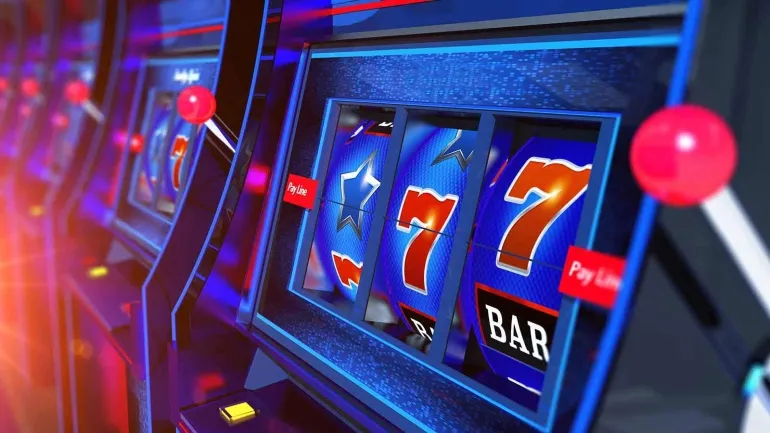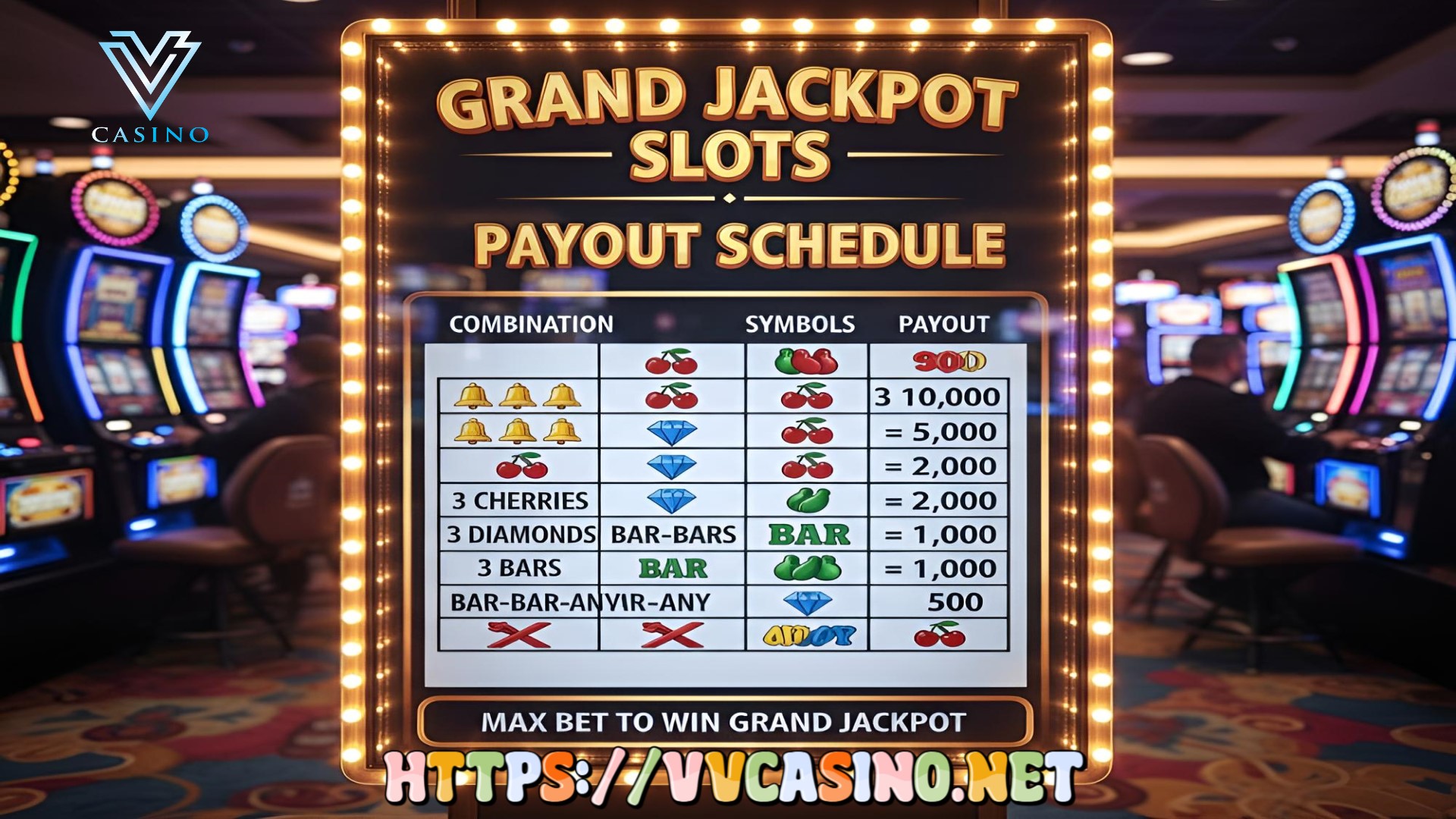
The slot machine—a captivating blend of dazzling lights, engaging sound, and the perpetual allure of a life-changing jackpot. While the experience itself is one of pure chance, the engine that powers the outcomes is rooted in precise mathematics. This engine is the Slot Machine Payout Schedule, an indispensable blueprint for understanding the true potential and risk of any game you play.
Far beyond mere lists of winning combinations, the payout schedule dictates the frequency and size of all wins. Mastering this schedule means moving from a purely hopeful player to a strategic one, capable of distinguishing between high-risk chases for millions and games designed for extended, steady gameplay.
The Anatomy of a Slot Machine Paytable

The most visible part of the payout schedule is the Paytable. This is your first crucial step in analyzing any slot machine, whether it's a classic three-reel machine or a modern video slot on a Premium Online Slots platform.
Key Paytable Components:
-
Standard Symbols & Payouts: This section lists the payout multiplier for matching 3, 4, or 5 (or more) of the game's standard icons. Higher-value symbols, like the game’s logo or main characters, contribute to larger wins, while low-value symbols (often card ranks like 9, 10, J, Q, K, A) contribute to smaller, more frequent returns.
-
Wild Symbols: These symbols substitute for standard symbols to complete a winning payline structure and payouts. They are critical for boosting calculating slot machine payouts and often carry their own high multiplier for a full line match.
-
Scatter Symbols: Scatters are the keys to a game's bonus features. They don't need to appear on an active payline; they just need to land anywhere on the reels to trigger free spins, mini-games, or significant cash prizes. The value of the scatter often hints at the game's overall volatility.
-
Paylines: Modern slots can feature anywhere from 1 to 1024 paylines. The paytable illustrates the shape and path of these lines across the reels. It is vital to note that a payout only occurs if the winning combination lands on an activated payline.
The Foundational Mathematics: Understanding RTP (Return to Player)
The single most important concept in the Slot Machine Payout Schedule is the Return to Player (RTP) percentage.
? RTP Explained
RTP is a theoretical statistical calculation that represents the percentage of all wagered money a slot machine will pay back to players over an extended period of time—typically over millions of spins.
-
Example: A slot with a 96% RTP is mathematically programmed to return $96 to players for every $100 wagered over its lifespan.
-
The House Edge: The remaining percentage (in the above example, 4%) is known as the House Edge—the casino’s long-term guaranteed profit.
It is crucial to understand that RTP is not a short-term guarantee. You might play 100 spins and win $200 (a temporary 200% RTP for your session), or you might lose all $100. The RTP is a theoretical average that applies across the entire global player base over the lifetime of the game. Experienced players seeking to maximize slot machine winnings always prioritize games with the highest RTP slots, as these offer the lowest house edge.
-
How Payouts Influence RTP: Every single prize, from a 5x line win to a massive progressive jackpot, is factored into the final RTP percentage. Slot providers use a master blueprint, sometimes called a PAR Sheet (Probability Accounting Report), that mathematically balances the size of the prizes against the slot machine odds and probabilities of them hitting to arrive at the specified RTP.
The Risk Factor: Slot Volatility vs. RTP
While RTP tells you how much a machine pays back, Slot Volatility (also called Variance) tells you how it pays back—specifically, the frequency and size of the wins. Understanding the interplay between volatility and RTP is key to choosing a game that matches your bankroll and risk tolerance.
High Volatility Slots ?
-
Payout Profile: Infrequent but Large Payouts.
-
Gameplay Experience: Long "dry spells" where few or no wins occur, punctuated by the chance for a massive win, such as a major jackpot or a highly lucrative bonus round.
-
Best For: Players with a large bankroll and high-risk tolerance who are willing to wait for the chance to hit a huge score. These slots are where the true adrenaline-fueled chases for millions happen.
Low Volatility Slots ?
-
Payout Profile: Frequent but Small Payouts.
-
Gameplay Experience: Wins hit often, keeping the balance topped up and extending playtime. Payouts are often less than or only slightly more than the initial bet.
-
Best For: Players with a smaller bankroll or those who prefer extended gameplay sessions and consistent, smaller wins. They are excellent for clearing bonus wagering requirements.
Medium Volatility
-
Payout Profile: A balance of the two, offering a decent frequency of smaller wins with the occasional potential for a sizable, significant prize.
You can often gauge the volatility of a game by looking at the paytable: a huge difference between the 5-symbol jackpot and the 4-symbol prize is usually a sign of high volatility slots.
The Technological Heart: The Random Number Generator (RNG)
All modern slot machine payouts, both in land-based casinos and on a Secure Slot Platform, are governed by the Random Number Generator (RNG). This is the core technology that ensures every single spin is completely random and independent.
How the RNG Determines the Payout Schedule:
-
Perpetual Motion: The RNG is a complex algorithm (specifically a Pseudo-Random Number Generator, or PRNG) that is continuously running, generating thousands of numbers every second, even when the machine is idle.
-
The Spin Action: When you press the spin button, the RNG instantly selects the number it is generating at that precise millisecond.
-
Mapping to Symbols: The selected random number is then mathematically translated to correspond to a specific stop position on each virtual reel. This process utilizes the game's Reel Strip Mapping. The "reel strips" are the programmed sequence of symbols on each reel. For a virtual 50-stop reel, the RNG selects which of those 50 positions to display on the payline.
-
No Memory: Crucially, the RNG ensures that every spin is an independent event. The system has no memory of past results. The idea of a machine being "due to hit" or "hot" or "cold" is a common myth—the probability of the next spin is unaffected by the previous 100 spins. This is the foundation of fairness in all regulated slot games.
The RNG in slots is continuously audited by independent testing agencies (like eCOGRA, GLI, or iTech Labs) to ensure its mathematical integrity aligns perfectly with the published RTP and understanding return to player (RTP) values.
Strategic Paytable Analysis and Maximizing Returns
To truly benefit from knowing the payout schedule, you must incorporate a basic strategic approach based on the game's published figures.
1. Pay for the Features
Many modern slots have a low base game RTP, with the vast majority of the expected return locked away inside a bonus feature (e.g., Free Spins with guaranteed Wilds or Multipliers).
-
Strategy: If a game's large jackpot or main prize is tied to a bonus round, you must ensure you bet enough to qualify for that feature. Some older slots require a maximum bet to be eligible for the Progressive Jackpot, making the lower-bet sessions less effective from a long-term mathematical perspective.
2. Identify Loose Slots Strategy
The term "loose slots" traditionally referred to land-based machines with a higher-than-average RTP. Today, in the online world, it simply means finding the games with the highest published RTP.
-
Actionable Tip: Always check the game's information (usually an "i" button) for the RTP value before playing. Look for games above 96%, as these offer a better chance to increase slot machine payouts over time compared to the industry average.
3. Match Volatility to Bankroll
Your approach should be dictated by your risk tolerance:
-
Small Bankroll: Opt for low volatility slots. These will give you more frequent wins, preserving your bankroll and extending your play session, allowing you to meet wagering requirements or simply enjoy the game longer.
-
Large Bankroll: Target high volatility slots. You can afford the long periods without a payout, holding out for the massive, game-changing wins that are mathematically concentrated in these machines.
Conclusion: Decoding the Code to Play Smarter
The Slot Machine Payout Schedule is not an impenetrable secret; it is the mathematical roadmap to every spin. From the simple multiplier values on the paytable to the complex algorithms of the RNG and the long-term averages of RTP, every element is designed to ensure a precise, predictable return to the house while offering the player a thrilling, random, and fair chance to win.
By committing to how to read a slot machine paytable, understanding the core difference between high volatility vs low volatility slots, and always prioritizing high RTP games, you move beyond mere reliance on luck. You arm yourself with knowledge, allowing you to make informed, strategic decisions to find the best paying slot machines and enhance your experience on any platform, including VVCasino Casino Slots.
FAQ
The most important number is the RTP (Return to Player) percentage. This theoretical statistic indicates the percentage of all money wagered that the slot machine is programmed to pay back to players over the long run (millions of spins). A higher RTP means a lower house edge and a better potential return for players over time.
Slot volatility (or variance) is determined by the game's reel mapping and paytable, which dictates the frequency and size of payouts. It matters because it governs your risk level: High volatility means rare but large wins (suited for big bankrolls), while low volatility means frequent but small wins (suited for smaller bankrolls and longer play sessions).
No, reputable and licensed casinos cannot change the published RTP of an online slot machine. The RTP is an integral part of the game’s core software and Random Number Generator (RNG), which is certified and regulated by independent testing agencies (like eCOGRA). Any changes would require re-certification.
The RNG is a software algorithm that constantly generates thousands of numbers every second. When you hit 'spin', the most recently generated number determines the reel positions and the outcome. The RNG ensures that every spin is completely random and independent of the last, meaning there are no "hot" or "cold" machines or predictable cycles to exploit.
You can almost always find the RTP and a detailed paytable (the visible part of the payout schedule) within the game itself. Look for an 'i' (information) icon, a menu button, or a 'Help' or 'Paytable' section on the main game screen. Reputable Trusted Slot Games providers always make this information accessible.
The practical difference is the long-term house edge. The 97% RTP slot has a 3% house edge, meaning the casino expects to keep $3 for every $100 wagered. The 94% RTP slot has a 6% house edge, meaning the casino expects to keep $6 for every $100 wagered. Over thousands of spins, the 97% slot offers significantly better long-term value and is a better choice for maximising slot machine winnings.
The number of paylines dramatically influences the payout schedule by increasing the hit frequency (how often a winning combination is registered). A slot with 243 ways-to-win will have a much higher hit frequency than a 10-payline slot, but the individual payouts for each line win will generally be smaller to maintain the overall target RTP.
Yes, Progressive Jackpots are included, but they often lower the base game's theoretical RTP. A small percentage of every bet goes toward funding the huge jackpot pool. This means the overall RTP is highly concentrated on the extremely rare jackpot win, often making the base game's smaller payouts less frequent than a non-progressive slot with the same published RTP.
Look for a very large gap in payouts between the top combination (e.g., 5-of-a-kind) and the next highest payout (e.g., 4-of-a-kind). If the top prize is 10,000x your line bet, but the next is only 500x, it is a strong indicator of a high volatility slot, where the majority of the RTP is weighted toward the rarest outcomes.
Reel Strip Mapping is the mathematical design that maps the virtual reel stops to the physical symbols. The RNG generates a random number, and the reel map translates that number into the final displayed symbols. The map determines the weighting of symbols; for instance, the jackpot symbol might only appear once on a virtual 100-stop reel, ensuring a low probability of hitting the jackpot combination, which is essential for controlling the slot machine odds and probabilities.



